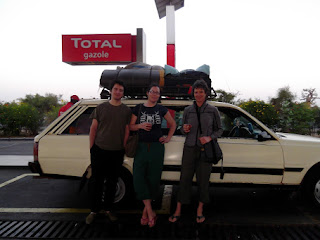Just after Christmas my mom and brother arrived from California. After they landed in Dakar they got to sleep for a few hours before piling in to a "sept-place" station wagon for the long drive down to Kédougou. We hired Seydou, one of the best drivers in town, and shared the car with PCV Ilana and her visiting family, which made for a much more comfortable ride than would have been possible on public transport.
We spent a day in Kédougou, where they got to see the market and the tailor and visit the wonderful Regional House. It was great except that this is brush- and field-burning season and the air was thick with smoke and dust. Then we headed out to Salémata, where I got to introduce my American family to my Senegalese family here, which was really great. We spent time just hanging out on the family compound, played with the little kids and chatted with my host parents.

My mom decided that she wanted to have her hair braided and my host sister Kesso (a professional-level hair stylist) was happy to oblige. I made henna from scratch, for decorating my mom's feet and the neighborhood kids' hands, and by the end of the visit everyone said that mom was clearly African now. It was really good to be able to bring my American family by the health center, to see some of the latrines being built, and to meet my friends around town, to have dinner with my friend Maimouna, and just generally to show them my life and work here. We dayhiked to the Bassari and Bedik villages, tried palm wine, saw monkeys, hormbills, and a chamelon. It was abundantly clear that host family was really glad to meet my mom and brother -- I've never eaten so well in my time here, and when it came time to leave they showered them with gifts of baobab powder, fonio grain, shea butter, and local crafts.


From Salémata we headed back to Kédougou (to pick up things from the tailor, belatedly celebrate PCV Patrick Hair's birthday, stroll by the river, where we saw a monitor lizard) and then on to Toubacouta. While stopping for lunch in Kaolack we had the good fortune to run into PCV Dan, who came with us to Toubacouta, showed us around, and was just generally very good company. We kayaked through the mangroves, walked with the lions at the Fathala Park, had several lovely dinners, and lounged our way through some very lovely sunsets over the water.
After that it was on to Mbour, where we stayed in a great little beachside bungalow-style hotel and enjoyed more than our fair share of the delicious
Liqueurs de Warang - Passionfruit, Citrus, Ginger & Bissap (like hibiscus), Corrosol (soursop), Cashew Fruit, and Creme de Warang (choco-cafe-banana cream). After the beach we headed up to Dakar, which is kind of an awful city for tourism (harassment, trash-strewn streets, grime and noise abound) but
visiting Goreé Island with PCVs Nic & Ivy and their visiting family was great, as was rooftop dinner with our friends Rachel, Emily & Xavier at a fantastic Ethiopian place.
We met up with my host brother Saliou, who lives in Dakar, where he goes to University. I'd never met him before (but I have greeted him on the phone when he calls Salémata on holidays and the phone gets passed around) and he turns out to be smart and gracious and a really good English speaker. As Family Time in Senegal drew to a close my mom, brother and I saw one of the loveliest sunsets ever, just off Point des Almadies (the westernmost part of Africa), and then headed over to the airport to drop our mom off for her flight.

All the translating, introducing, arranging transport, long car rides, bargaining and explaining were exhausting at times but I'm extremely glad that my mom and brother were able to visit. It was wonderful to spend time with them, after I get back to America they'll have a much better understanding of my Peace Corps service than they ever could have gotten from photos and e-mails, and it means so much to my host family and friends that they came to visit from so very far away.


















































